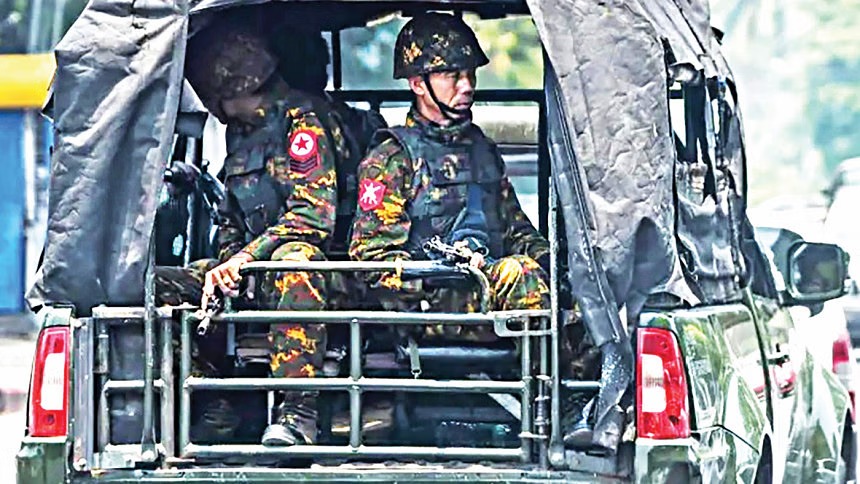Post-coup Myanmar: War crimes by military ‘more frequent, brazen’

![]()
News Desk
War crimes committed by Myanmar’s military, including the bombing of civilians, have become “increasingly frequent and brazen”, a team of United Nations investigators said in a report published yesterday.
The report by the Independent Investigative Mechanism for Myanmar (IIMM), which covered the period between July 2022 and June 2023, said there was “strong evidence that the Myanmar military and its affiliate militias have committed three types of combat-related war crimes with increasing frequency and brazenness”.
These crimes include the indiscriminate or disproportionate targeting of civilians using bombs and the burning of civilian homes and buildings, resulting at times in the destruction of entire villages, it said.
The report also cited “killings of civilians or combatants detained during operations”.
“Our evidence points to a dramatic increase in war crimes and crimes against humanity in the country, with widespread and systematic attacks against civilians, and we are building case files that can be used by courts to hold individual perpetrators responsible,” said Nicholas Koumjian, head of the IIMM.
Since a junta seized power two years ago, Myanmar has been plunged into chaos, with a resistance movement fighting the military on multiple fronts after a bloody crackdown on opponents that saw Western countries re-impose sanctions.
A spokesperson for the junta could not be reached for comment on the findings made by UN investigators.
The junta has previously denied atrocities have taken place, saying it is carrying out a legitimate campaign against terrorists.
Although it has justified bombings as attacks against military targets, UN investigators said the Myanmar military “should have known or did know” that a large number of civilians were in or around the alleged targets when the attacks took place.
Meanwhile, Indonesian President Joko Widodo yesterday said a resolution to the Myanmar crisis that has dragged into its third year needed “political will” from all sides of the conflict, as divided Southeast Asian nations step up diplomatic efforts.
“We are aware the situation in Myanmar is still full of challenges. We must also realise this situation can only be resolved if there is political will from all parties,” he told an anniversary event for the Association of Southeast Asian Nations (Asean).
The Indonesian leader told foreign dignitaries the 10-member bloc, which includes Myanmar, must continue to work together to find a breakthrough to the crisis.
“Asean, as a big ship, must move forward. This big ship must continue to sail,” he said. “This big ship cannot sink because this is our responsibility to hundreds of millions of people inside.”
Indonesia is this year’s chair of the Asean bloc and will host a leaders’ summit in September. Jakarta has engaged in what it calls “quiet diplomacy” with the Myanmar junta in a bid to bring it back to the negotiating table.
Widodo said the bloc’s efforts to solve the crisis would continue along the lines of a five-point deal agreed with Myanmar’s junta two years ago.
But the junta has largely ignored that agreement, which aims to end violence and resume talks between the military and the anti-coup movement.